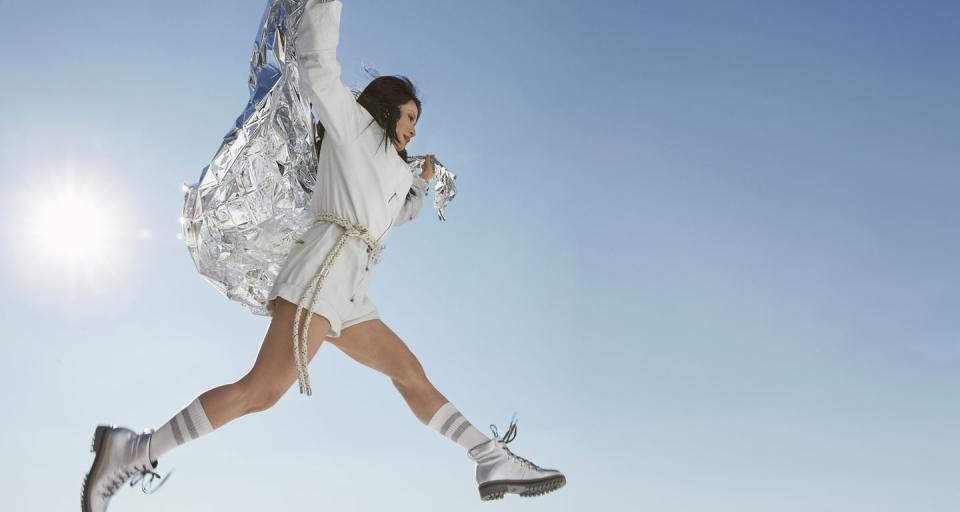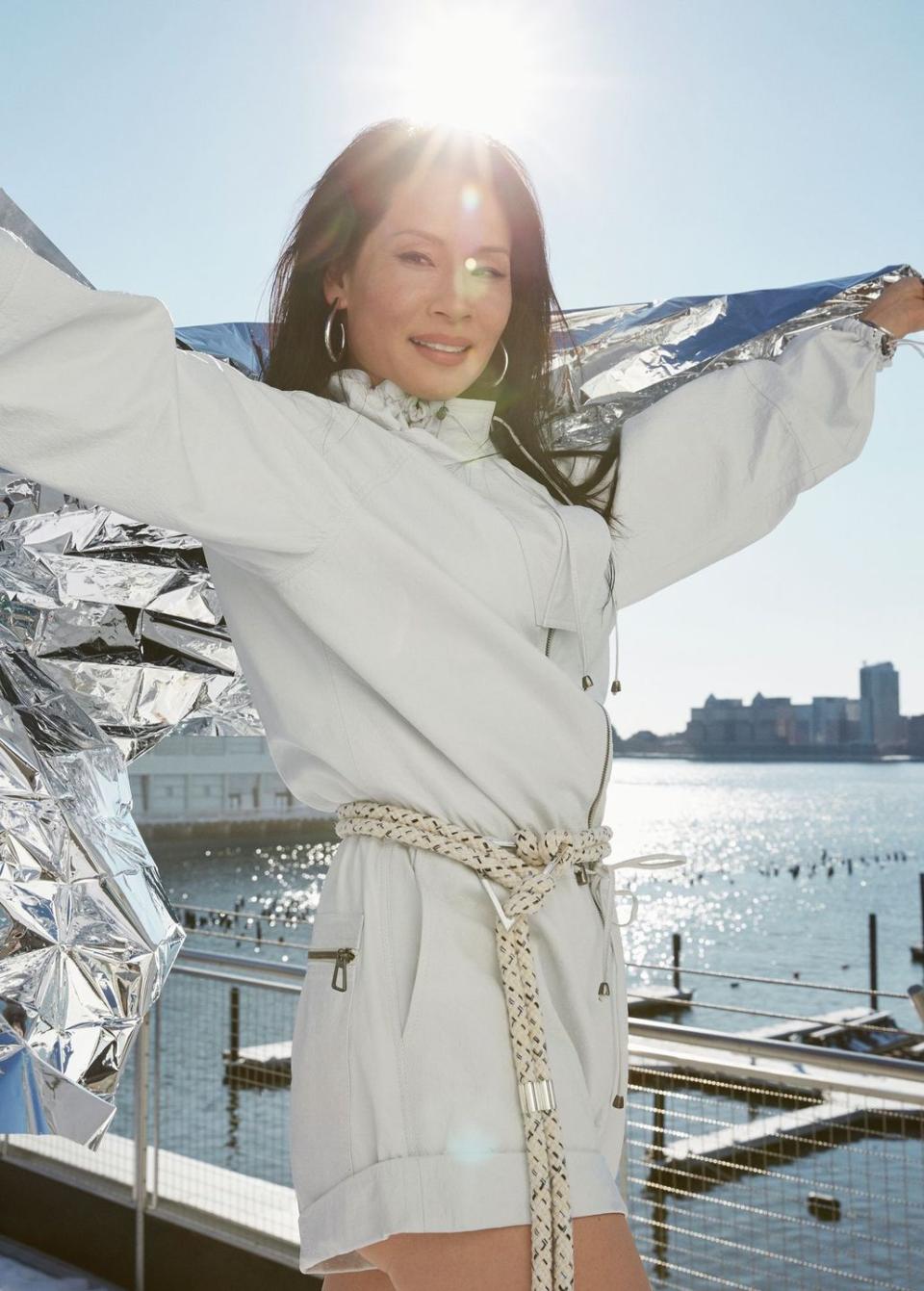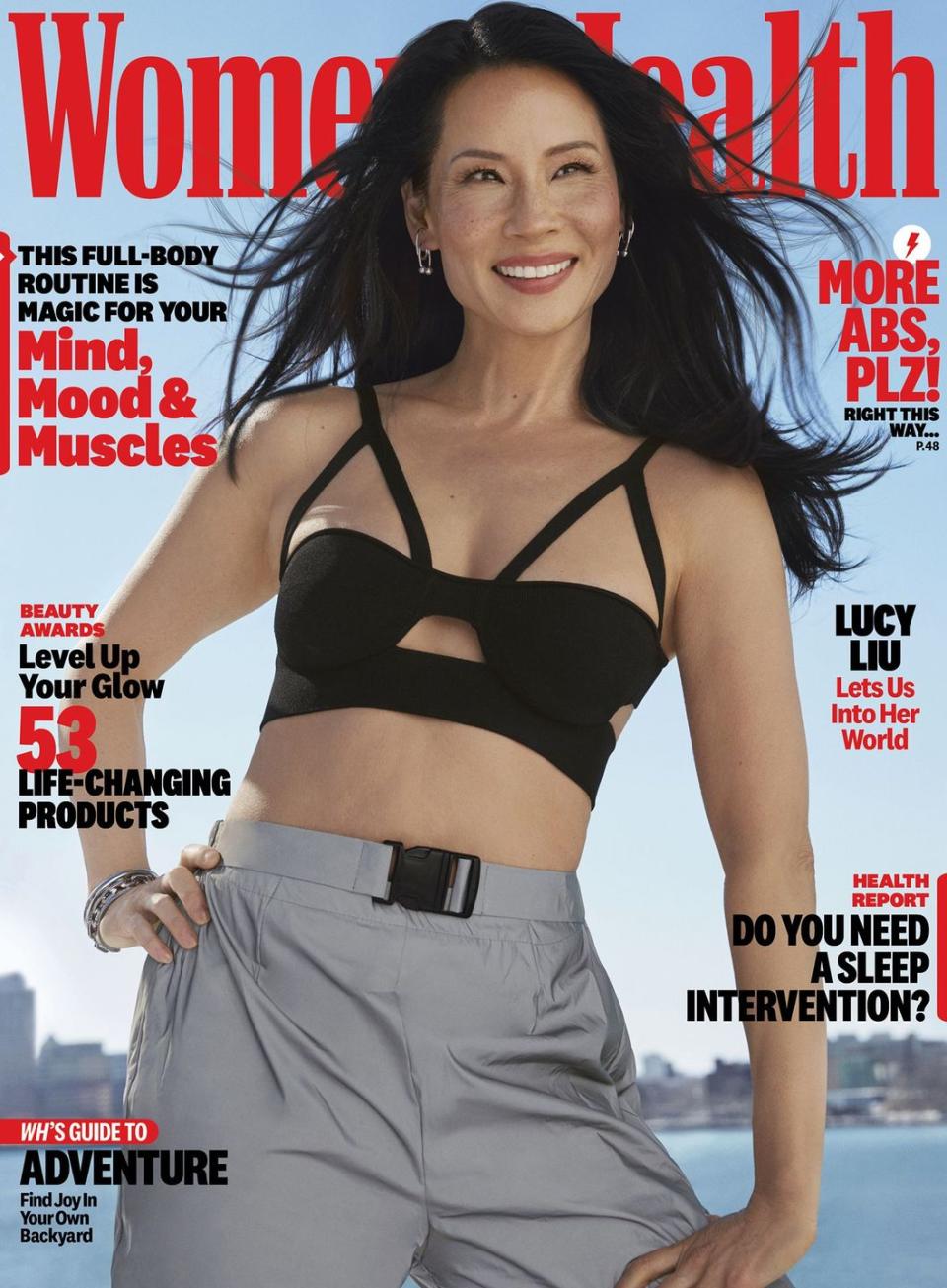Lucy Liu Says People Used To Label Her As A ‘Dragon Lady’

may have met an open book once or twice in your life—the kind of person who tells you their deepest, darkest secrets without even knowing your first name. Lucy Liu is not one of those people. Her discretion is partly the result of a decades-long run as a Hollywood actress and celebrity (she’s been burned before and keeps her personal life…personal). But it goes back much further than that, to her upbringing in a Chinese American family.
“There’s a shield that, culturally, I was raised in,” Lucy tells me over Zoom from her apartment in Manhattan. “It’s not just a veil. It’s a shield.” She’s speaking generally about values, but also specifically about the body—something she had little awareness of and even less comfort with until she became an adult and an artist (she draws and paints, in addition to acting and directing). “I don’t think I ever even looked at myself,” she says. “I didn’t know about the human body.”
Now that Lucy is a mother herself—her son, Rockwell, is 5 years old—she’s encouraging her child to develop a different relationship to his body than she had with hers. They talk about his anatomy frankly (no “silly names”) and without shame.
“There should be a sense of openness with your body, to run around naked and to feel the freedom of that until you don’t feel comfortable doing it anymore,” she says. “When he decides he doesn’t want to run around naked, then that’s fine.”
Paying attention to her body, as well as leaning into one of her core beliefs—that the mind and body are more connected than we think—feels especially important now because, at 52, she wants to be as healthy as possible for Rockwell. That means eating the right foods to stay “lubricated.” For nearly a year, she went vegan. Then, last December, she transitioned to vegetarianism. “I make a lot of things for my son that have cheese and eggs in them, so I eat with him because he loves sharing food.” (And because her acupuncturist suggested putting eggs back in her diet.)
Lucy has found that plant-based eating gives her more energy and less bloat. She’s been cooking more these days: She’s a fan of savory quinoa porridge, as well as soup, like the one she makes with red dates, lotus root, and lion’s mane mushrooms.
Watch Lucy talk about how she learned to accept her freckles and advocate for her health:
She has also long relied on Eastern treatments, such as acupuncture, in addition to Western medicine. She sees a doctor regularly for muscle response testing, an alternative practice that involves evaluating muscle strength to uncover deficiencies in the body. Transcendental Meditation is a daily practice for her, a way of keeping her mind and willpower strong. She’s currently a fan of SoulCycle and takes a 20-minute class on her SoulCycle at-home bike, in addition to doing 10 minutes of arm work. “It helps get the engine running,” Lucy says. “It wakes up the body and the mind.”

This acute awareness of internal rhythms is in some ways a response to her upbringing, Lucy says. As an adult, she has devoted herself to intentionally tuning in—not just to her body, but to everything from her career choices to the time she goes to bed each night (when she feels ready, no matter how early). The goal? To make sure she’s always staying true to herself.
Early on in her life as a public figure, Lucy was photographed by paparazzi as she was taking out the garbage in a robe. While this may seem like just a regular part of today’s celebrity ecosystem, to Lucy, “it was so invasive.” In an attempt to reclaim some agency, she decided to be more aware of how she moved around in public. Her purpose in doing this issue’s cover, in fact, is to show that “you don’t have to be 20 to wear a bathing suit,” she says. “With all the flaws and all the life that a body experiences, it’s still something that you should carry with confidence.”
Which has at times been a hard-earned lesson. Lucy recalls a few early professional decisions that, in hindsight, she wouldn’t repeat: “For some of the photo shoots, now I would think, Maybe I don’t get on all fours.” This comes up in the context of a discussion about Lucy being one of very few Asian American household names in Hollywood, and how she’s dealt with being objectified or exoticized. She explains how naive she was about the rest of the world’s perception of her. “When people started to label it as ‘dragon lady’ or ‘geisha’ or whatever—I had to look up ‘dragon lady,’” she says. “I literally was like, ‘What is this? I don’t even know what that means!’” I suggest that’s because she grew up in one of the most multicultural places on Earth: Queens, New York. By way of agreeing, she says, “Who’s going to call me dragon lady on the street? I had to learn this.”
Now, with the current conversation about racism against Asian Americans and the numerous violent incidents (some stoked by racist descriptions of COVID) that Lucy refers to as “terrifying” and “outrageous,” she’s come to a stronger stance on the power of labels. “This proves, without a doubt, that words matter,” she says. “It clarifies that when violence happens, [it’s because] the seed has been planted through thoughts and words that give people permission to act out their frustrations and anger. People who use [racist] words, or who don't use their words to protect other people, are complicit—regardless of what side or color you represent in the political atmosphere.”
These feelings have infiltrated her everyday life in NYC, too. “I don’t feel relaxed enough to take my son out without having a plan,” she says. “I don’t improvise and explore the city, which is the whole point of being in New York City. I was born and raised here. I chose to live in a cosmopolitan place because I feel safer in it. These attacks have really created a vulnerable feeling, not just for me but for so many other people.”
While she’s now much more aware of what’s happening around her as well as others’ perceptions of her, Lucy has no desire to live her life to please others. “People are going to see you however they’re going to see you,” she says. And that ethos extends to her career choices too. Lucy chooses jobs she feels connected to, not ones that will be familiar to an existing audience. “If I kept doing only action movies, I would probably wake up one day and not even know who I was,” she says.
In the before times, Lucy was always working. She was so often found on-set, in her trailer, that when Rockwell would pass a random one on the street, he’d say, “Mommy’s trailer!”
“He thought I lived there,” she says. “I was in there all the time.”

As for all of us the world over, the pandemic dramatically changed her life. For the past year she has been rooted in her apartment, and it’s allowed her to spend much more time with Rockwell. They eat together, read together, draw together, and have even started taking ukulele lessons together. It’s a life quite unlike before, when she’d be out of the house before he woke at 6 a.m. “Having him know that this is home, and I’m home, is really a nice feeling,” she says.
The Lucy of today continues to evolve and has, really for the first time in her career, decided to use her civic voice. An ambassador for UNICEF since 2004, she once maintained an apolitical stance. But the recent events led her to speak out publicly in a new way on social media and TV. “Sometimes you have to step out of your comfort zone to go there,” she says. “I’m willing to do that because I don’t want other people to feel unsafe. I want some of the people who think this is okay to know that this is not okay.”
But it’s about more than just making her feelings known. She wants to influence action. “If I have a voice and I can use it for the better, and if it can help influence people to go out and vote…” She adds that Asian Americans historically haven’t voted at the same rate as white Americans. “We don’t think our voices matter, and they do.”
Life, for her, is not about checking boxes, but about listening to what is true for her in the moment. “I do what I want according to how I feel,” Lucy says. “I don’t have to fall into a social norm of ‘now you’re going to get married.’ No! Not because I’m rebelling against it. When it’s right, it’s going to be right. But I’m not going to do it for the sake of doing it. Marriage is not on my bucket list. I don’t have a bucket list.”
Even if Lucy did have one, it’s easy to imagine she’d keep its contents to herself. After all, she’s learned to hold tight to the things that matter most to her, letting only a select few in. She’s an independent woman—and that’s how she likes it.

This article originally appeared in the May 2021 issue of Women’s Health; the digital version has been updated with additional quotes.
Photographed by Aingeru Zorita; Fashion Director: Kristen Saladino; Hair: Marco Santini at TraceyMattingly.com. Makeup: Rebecca Restrepo at TraceyMattingly.com. Prop Styling: Cate Geiger.
You Might Also Like